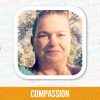Each morning, one of Diane Hudgens’s “sweetheart” residents shuffles down the hall to greet Diane in her office, give her a hug, a peck on the cheek, and tell her how much she loves her.
Hudgens has filled many different positions throughout her career, but she says she always returns to health care, because: “it’s something that makes me happy.”
Even within the senior health care industry specifically, she has adapted to different roles. She started out working in billing, then joined Consulate as a CNA on the floor for 2 years, before she jumped behind the front desk to fill in as a receptionist. After that, she moved into the accounts payable department, and then to Medicaid and medical records. Hudgens has now worked for Consulate for 7 years, and hopes to continue her professional growth within the company.
Currently, as Medical Records Coordinator and Medicare Specialist at Consulate Health Care of New Port Richey, Hudgens works closely with many families dealing with emotional stress and financial burdens. She said she aims to alleviate their burden by building personal relationships with them and hopefully putting them at ease.
Hudgens said she’s thankful for the opportunity to get to know her fellow staff members, residents, and their families “on a personal level,” and that the appreciation runs both ways. “They tell you daily, ‘thank you for all your help . . . You just don’t know how much you have helped us’ . . . Because it’s hard putting your family member in a care center,” Hudgens explained.
“[Consulate Health Care of New Port Richey] makes me feel like I have a second family. I enjoy working with everyone everyday. We’ve all become close.” However, Hudgens’s familial connection to Consulate Health Care doesn’t stop there—she even brought her mother to the center as a resident.
While Hudgens explained that “getting too attached to residents” is the greatest challenge of the job overall, she still follows her urge to adopt the residents, in a way. “I like that I have relationships with them on a personal basis. . . When I first started here, a lot of families used to come see their residents, but people move away, etc. Some residents don’t have families, so we are their family. We see them everyday and let them know that someone cares for them.”
If you found an error, highlight it and press Shift + Enter or click here to inform us.



